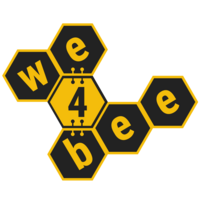we4bee - Learning and researching with bees
If you have questions about this project, please contact Padraig Davidson, Anna Krause or Andreas Hotho.
Abstract
we4bee would like to make it possible to predict the need for beekeeping action (e.g., feeding time, swarming time, breeding condition etc.) and environmental events (e.g., earthquake) with the help of high-tech sensors developed for use in beehives and a connected BigData analysis as well as machine learning. In addition, the data analysis should contribute to a better understanding of bee behaviour, ensure the preservation of the honey bee and thus make an important contribution to environmental protection.
Bees pollinate 80% of all useful and wild plants and thus have a worldwide economic benefit of 265 billion euros. Monocultures and the associated use of pesticides threaten the honey bee and have already led to the disappearance of this animal in parts of China. Since then, migrant workers there have had to laboriously pollinate fruit trees by hand. In order to counteract this alarming development and ensure the preservation of the honey bee, we must better understand its behaviour and needs.
Therefore, we4bee would like to lend TopBar hives equipped with high-tech sensors to schools, universities and young beekeepers in order to collect and analyse data transmitted on temperature, humidity, air pressure, weight, sound/vibration, light intensity and fine dust pollution. The aim is to place half of the hives in urban areas and the other half in rural areas in Germany in order to determine any differences between urban and rural bees.
In order to improve the understanding for the importance of the honey bee for humans and our environment, the educational facilities are supplied besides with interdisciplinary teaching material approximately around the bee. A web and a mobile app also allow users to clearly display the data collected for each beehive. In addition, the students/users/participants are given an insight into the fascinating world of embedded computer and high-tech environmental sensors, which are also used in automotive engineering at Audi.
It goes without saying that all the data collected will be made accessible to the general public.
Project Information
Project leaders: Prof. Dr. Jürgen Tautz, Prof. Dr. Andreas Hotho
Duration:
- February 2019 - January 2020 (Audi Stiftung für Umwelt)
- January 2020 - December 2022 (Bayerisches Staatsministerium für Digitales): we4bee@stmd
Project website: https://we4bee.org
Staff
The following persons are involved in this project:


